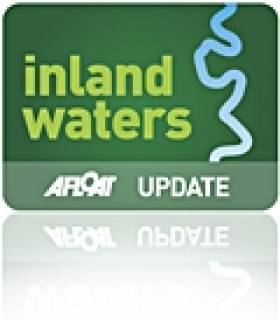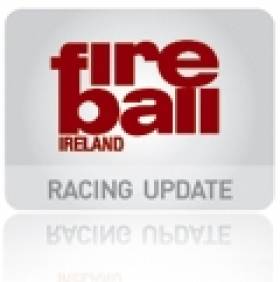Displaying items by tag: Killaloe
Hire Cruiser Hits Killaloe Bridge
The Cruiser was holed and was taking on water.
Killaloe Coast Guard Mobile unit was tasked to Derg Marina with salvage pumps while the Coast Guard Rescue Boat also responded according to a Coast Guard blog report here.
It was decided that in order to save the vessel from sinking that the Coast Guard would run the cruiser aground in the shallow water at nearby Ballyvalley.
Tipperary Boat Dealer 'Closes the Doors'
Tipperary Boat dealer Marine Action Boats Ltd, based on the river Shannon at Birdhill has 'ceased operations' according to an announcement on the firm's website. The Sports boat dealership 'closed its doors' and ceased trading on December 31 2010, according to managing director, Tadhg Foley. Marine Action Boats were sole importers of Crownline Sports Cruisers for Ireland, according to the website. The sports boat section of the marine trade market has been one of the hardest hit by the economic downturn. The firm also handled brokerage, repairs and boat maintenance. The full text of the announcement is as follows:
"Despite great efforts from ourselves and our loyal team, we would like to announce that we have ceased operations at Marine Action Boats, and we are no longer trading. We would also like to thank all our customers and our suppliers for their support over the past decade".
Shannon Cruiser Crash
A man at the upper controls of a cruiser on the inland waterways jumped to safety just before his vessel hit a bridge in Co Tipperary on Friday last.
The man was believed to be attempting to moor the vessel close to the bridge at Ballina on the Shannon when he lost control. The boat hit one of the bridge arches causing extensive damage to the boat’s upper-level console. It is believed that only for the water level at the time and his quick actions he could have been seriously injured.
There were six people on board the vessel all of whom were in the lower deck and uninjured.
The incident was witnessed by a member of the Killaloe unit of the Irish Coast Guard, who raised the alarm. Rescuers went to the scene and discovered that the cruiser had been extensively damaged.
Butler & McCarthy Take Season Opener
The Irish Fireball fleet, minus those boats in transit from Barbados, descended on Killaloe at the southern end of Lough Derg for the season-opening regatta, the Open Sailing Championships. Hosted by the Killaloe Sailing Club for the first time in quite a few years, but based at the University of Limerick’s Activity Centre, the event attracted an excellent entry of 25 boats considering there were some significant absentees.
A large percentage of the fleet was home-based and the racing on the water was soon to validate the training sessions that Neil Colin and others have conducted both in Killaloe and Dun Laoghaire, when participants in those sessions featured in excellent individual race performances and overall positions.
Race Officer Liam Moloney and his team on the water had a very challenging weekend as the winds were light and on Sunday in particular, variable. Having said that, seven races were sailed when Race 3 was ordered to be re-sailed after a protest! The lightness of the breeze presented the fleet with the need for heightened awareness of wind on the water and meant that decisions on which way to go were much more significant than when the wind is more vigorous!
The new combination of Shane McCarthy & Noel Butler provided the element of consistency that these conditions demand to win by a comfortable margin of 4 points, but in terms of individual race wins they only took half the races. However, a discard of a 3rd shows how well these two sailed in the trying conditions.
The other race wins were shared by Neil Colin & Margaret Casey, who finished second overall, Louis McKenna & Hermine O’Keeffe, who took third and Simon McGrotty & Ruairi Grimer who finished fourth overall. Colin/Casey had a very good series after discarding a tenth, while McKenna/O’Keeffe surprised everyone with the consistency of their boatspeed all weekend allowing them to win one race and add three other top four positions to their points tally.
Jim Ryan & David Tanner from the host club also hit a purple patch, scoring a 2nd, a 5th and a 6th to be the first local boat in 5th overall. Jon Evans & Aidan Caulfield led the fifth race of the regatta and only just lost out on the finish line to Butler/McCarthy. Other excellent race performances came from Marie Barry who counted three top ten finishes, Susie Coot & Christope LeScornet, in the Silver fleet who also scored three top ten finishes, Mary Chambers & Brenda McGuire who got a 9th in the last race and Derval O’Carrol & Siobhan Hayes who scored an eighth in Race 2. All these combinations were attendees at recent training sessions and this weekend saw the fruits of that training.
Saturday evening was spent in Crotty’s in Killaloe where the fleet enjoyed superb hospitality and lots of craic having pre-booked their meals for the evening at registration that morning. A traditional three-piece band played in the background keeping us distracted while with one eye on the TV screen we watched Ireland’s entry to Eurovision drop further and further down the scoreboard.
Having sailed four races on the Saturday, we appeared to be set up for an early finish on the Sunday when only two races were required to make up the series. However, with Race 3 thrown out on a technicality, three races were sailed on Sunday, before our guillotine on start times kicked in and a full six race series was completed.
The prevailing conditions meant that races were short and they may not have been to everyone’s taste, but in truth the race team did everything they could to get a regatta in and they couldn’t be faulted for effort.
The regatta also saw the competitive debut of our newest Fireball, 15018, a home built wide-bow in wood by Martin O’Toole. As the results below show, Martin and his crew Shane scored a 5th in one race.
Prizes for the event were provided by McWilliam’s Sailmakers and due thanks were offered to all those who had sponsored and contributed to the hosting of the event.
Sail No. Helm Crew Club 1 2 3 4 5 6 Total
Gold
14894 Noel Butler Shane McCarthy DMYC 1 3 2 1 3 1 8
14775 Neil Colin Margaret Casey DMYC 2 1 3 10 4 2 12
14691 Louis McKenna Hermine O’Keeffe RStGYC 8 6 4 3 1 4 18
Silver
14176 Susie Coote Christope LeScornet KSC 15 7 10 15.5 7 13 52
14416 Mary Chambers Brenda McGuire DMYC 17 15 12 22 17 9 70
15018 Martin O’Toole Shane O’Toole SSC































































